Origins of psychology When did it begin as a science 1879
Origins of psychology
When did it begin as a science? 1879
* • What is an empirical question?
* • Nature vs. nurture
ABC’s of Psychology – what does each letter stand for?
Historical perspectives – what are the key features of each?
* • Structuralism
* • Functionalism
* • Psychoanalytic
* • Behaviorism
Modern perspectives – what are the key features of each?
* • Humanism (Positive)
* • Cognitive
* • Biopsychological (Neuroscience)
* • Sociocultural
* • Evolutionary
Types of professionals in psychology – what are the differences?
* • Psychologist vs. psychiatrist vs. psychiatric social worker
Areas of specialization in psychology – know what each covers, in general
* • Developmental
* • Social
* • Educational
* • Health
* • Physiological
* • Experimental
* • Cognitive
* • Psychometrics
* • Abnormal
Study skills
* • What are the basics?
Critical thinking
* • What does it involve?
Scientific method
* • Why do we use it?
* • What are the five steps?
* • Know these terms:
* o Hypothesis
* o Variables
* o Operational definition
Conducting research
* o Descriptive methods – know the key features, what each is used for, its benefits and drawbacks
* o Natural observation
* Observer effect
* Participant observation
* o Laboratory observation
* o Case Study
* o Survey
* Self-report and social desirability
* Representative sample – what does this mean?
Correlations – define these terms and be ready to apply these concepts to situations
* • Positive, negative, no correlation
* • Correlation coefficient – what is the range of possible numbers?
* • What’s the big warning about correlations?
Experimental methods – understand these terms and identify them in situations
* • Variables: Independent and dependent – know the difference
* • Groups – how do they differ?
* o Experimental
* o Control
* • Problems & Solutions
* o Experimenter bias
* o Placebo effect
* o Random assignment
* o Single-blind and double-blind studies
Ethics in research – basic guidelines
* • Human subjects
* • Animals
Neuroscience is the study of what?
Neurons – what are they?
* • Name the different parts
* o How they look, what they do
* • Types – what does each type do?
* o Sensory, motor, interneurons
* • Terminology - know these
* o Resting/Action potential
* o Synapse
* o Reuptake
* o Reflex arc
Glia: the other brain cells
* • What is their role?
Neurotransmitters
* • Recognize the names
* • What do they do?
Neural communication
* • Electrical impulse travels down the neuron’s axon through a series of action potentials
* • When the impulse reaches the axon ending, the message becomes chemical
* • Neurotransmitters are released into the synapse
* • They are received through specific receptor sites in the post-synaptic neuron
* • This continues through a long string of neurons until the message reaches its destination, the brain or other organs or muscles
The Nervous System
* • Central NS (name the 2 parts)
* • Peripheral NS (covers what parts of the body?)
* o Somatic NS
* Sensory pathway
* Motor pathway
* o Autonomic NS
* Sympathetic division– handles stress
* Parasympathetic division
Endocrine system
* • Major glands (recognize the names)
* • Hormones (recognize the names)
* o How are hormones released?
* o How does this differ from neurotransmitters?
The Brain – what are its jobs?
* • Cortex
* o What are the wrinkles called?
* o Why is it wrinkly?
* • Corpus collosum – what is this?
* • Lobes – know generally where these are
* o Occipital
* o Parietal
* o Temporal
* o Frontal
* • Left and right hemispheres – what are their different responsibilities?
* • Imaging – technology allows us to see inside the living brain using non-invasive procedures
* • Concussion – define
* o What sorts of reactions do the brain and body have
Origins of psychology
When did it begin as a science? 1879
* • What is an empirical question?
* • Nature vs. nurture
ABC’s of Psychology – what does each letter stand for?
Historical perspectives – what are the key features of each?
* • Structuralism
* • Functionalism
* • Psychoanalytic
* • Behaviorism
Modern perspectives – what are the key features of each?
* • Humanism (Positive)
* • Cognitive
* • Biopsychological (Neuroscience)
* • Sociocultural
* • Evolutionary
Types of professionals in psychology – what are the differences?
* • Psychologist vs. psychiatrist vs. psychiatric social worker
Areas of specialization in psychology – know what each covers, in general
* • Developmental
* • Social
* • Educational
* • Health
* • Physiological
* • Experimental
* • Cognitive
* • Psychometrics
* • Abnormal
Study skills
* • What are the basics?
Critical thinking
* • What does it involve?
Scientific method
* • Why do we use it?
* • What are the five steps?
* • Know these terms:
* o Hypothesis
* o Variables
* o Operational definition
Conducting research
* o Descriptive methods – know the key features, what each is used for, its benefits and drawbacks
* o Natural observation
* Observer effect
* Participant observation
* o Laboratory observation
* o Case Study
* o Survey
* Self-report and social desirability
* Representative sample – what does this mean?
Correlations – define these terms and be ready to apply these concepts to situations
* • Positive, negative, no correlation
* • Correlation coefficient – what is the range of possible numbers?
* • What’s the big warning about correlations?
Experimental methods – understand these terms and identify them in situations
* • Variables: Independent and dependent – know the difference
* • Groups – how do they differ?
* o Experimental
* o Control
* • Problems & Solutions
* o Experimenter bias
* o Placebo effect
* o Random assignment
* o Single-blind and double-blind studies
Ethics in research – basic guidelines
* • Human subjects
* • Animals
Neuroscience is the study of what?
Neurons – what are they?
* • Name the different parts
* o How they look, what they do
* • Types – what does each type do?
* o Sensory, motor, interneurons
* • Terminology - know these
* o Resting/Action potential
* o Synapse
* o Reuptake
* o Reflex arc
Glia: the other brain cells
* • What is their role?
Neurotransmitters
* • Recognize the names
* • What do they do?
Neural communication
* • Electrical impulse travels down the neuron’s axon through a series of action potentials
* • When the impulse reaches the axon ending, the message becomes chemical
* • Neurotransmitters are released into the synapse
* • They are received through specific receptor sites in the post-synaptic neuron
* • This continues through a long string of neurons until the message reaches its destination, the brain or other organs or muscles
The Nervous System
* • Central NS (name the 2 parts)
* • Peripheral NS (covers what parts of the body?)
* o Somatic NS
* Sensory pathway
* Motor pathway
* o Autonomic NS
* Sympathetic division– handles stress
* Parasympathetic division
Endocrine system
* • Major glands (recognize the names)
* • Hormones (recognize the names)
* o How are hormones released?
* o How does this differ from neurotransmitters?
The Brain – what are its jobs?
* • Cortex
* o What are the wrinkles called?
* o Why is it wrinkly?
* • Corpus collosum – what is this?
* • Lobes – know generally where these are
* o Occipital
* o Parietal
* o Temporal
* o Frontal
* • Left and right hemispheres – what are their different responsibilities?
* • Imaging – technology allows us to see inside the living brain using non-invasive procedures
* • Concussion – define
* o What sorts of reactions do the brain and body have
Origins of psychology
When did it begin as a science? 1879
* • What is an empirical question?
* • Nature vs. nurture
ABC’s of Psychology – what does each letter stand for?
Historical perspectives – what are the key features of each?
* • Structuralism
* • Functionalism
* • Psychoanalytic
* • Behaviorism
Modern perspectives – what are the key features of each?
* • Humanism (Positive)
* • Cognitive
* • Biopsychological (Neuroscience)
* • Sociocultural
* • Evolutionary
Types of professionals in psychology – what are the differences?
* • Psychologist vs. psychiatrist vs. psychiatric social worker
Areas of specialization in psychology – know what each covers, in general
* • Developmental
* • Social
* • Educational
* • Health
* • Physiological
* • Experimental
* • Cognitive
* • Psychometrics
* • Abnormal
Study skills
* • What are the basics?
Critical thinking
* • What does it involve?
Scientific method
* • Why do we use it?
* • What are the five steps?
* • Know these terms:
* o Hypothesis
* o Variables
* o Operational definition
Conducting research
* o Descriptive methods – know the key features, what each is used for, its benefits and drawbacks
* o Natural observation
* Observer effect
* Participant observation
* o Laboratory observation
* o Case Study
* o Survey
* Self-report and social desirability
* Representative sample – what does this mean?
Correlations – define these terms and be ready to apply these concepts to situations
* • Positive, negative, no correlation
* • Correlation coefficient – what is the range of possible numbers?
* • What’s the big warning about correlations?
Experimental methods – understand these terms and identify them in situations
* • Variables: Independent and dependent – know the difference
* • Groups – how do they differ?
* o Experimental
* o Control
* • Problems & Solutions
* o Experimenter bias
* o Placebo effect
* o Random assignment
* o Single-blind and double-blind studies
Ethics in research – basic guidelines
* • Human subjects
* • Animals
Neuroscience is the study of what?
Neurons – what are they?
* • Name the different parts
* o How they look, what they do
* • Types – what does each type do?
* o Sensory, motor, interneurons
* • Terminology - know these
* o Resting/Action potential
* o Synapse
* o Reuptake
* o Reflex arc
Glia: the other brain cells
* • What is their role?
Neurotransmitters
* • Recognize the names
* • What do they do?
Neural communication
* • Electrical impulse travels down the neuron’s axon through a series of action potentials
* • When the impulse reaches the axon ending, the message becomes chemical
* • Neurotransmitters are released into the synapse
* • They are received through specific receptor sites in the post-synaptic neuron
* • This continues through a long string of neurons until the message reaches its destination, the brain or other organs or muscles
The Nervous System
* • Central NS (name the 2 parts)
* • Peripheral NS (covers what parts of the body?)
* o Somatic NS
* Sensory pathway
* Motor pathway
* o Autonomic NS
* Sympathetic division– handles stress
* Parasympathetic division
Endocrine system
* • Major glands (recognize the names)
* • Hormones (recognize the names)
* o How are hormones released?
* o How does this differ from neurotransmitters?
The Brain – what are its jobs?
* • Cortex
* o What are the wrinkles called?
* o Why is it wrinkly?
* • Corpus collosum – what is this?
* • Lobes – know generally where these are
* o Occipital
* o Parietal
* o Temporal
* o Frontal
* • Left and right hemispheres – what are their different responsibilities?
* • Imaging – technology allows us to see inside the living brain using non-invasive procedures
* • Concussion – define
* o What sorts of reactions do the brain and body have
Solution
ABC’s of Psychology – what does each letter stand for?
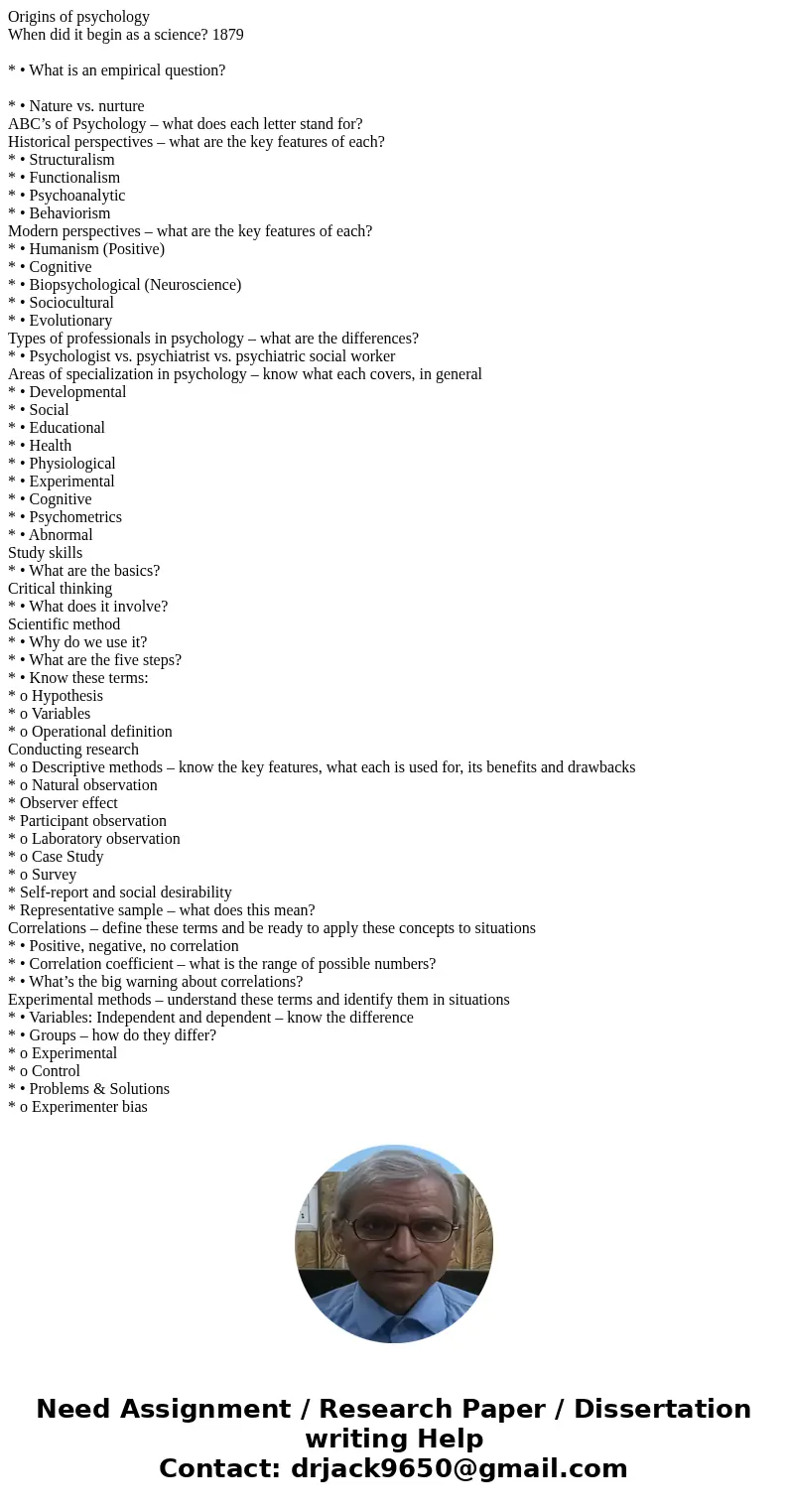
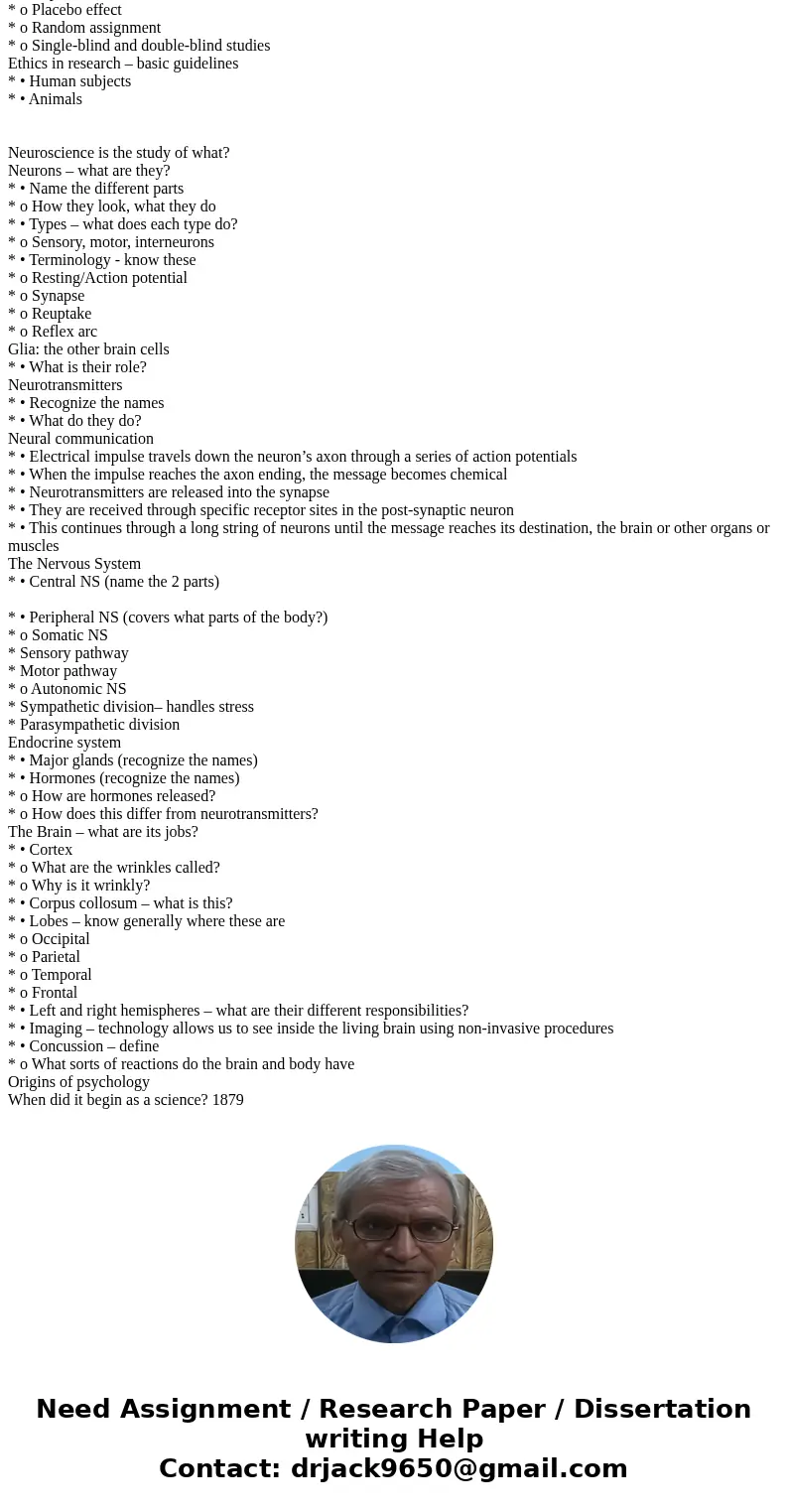
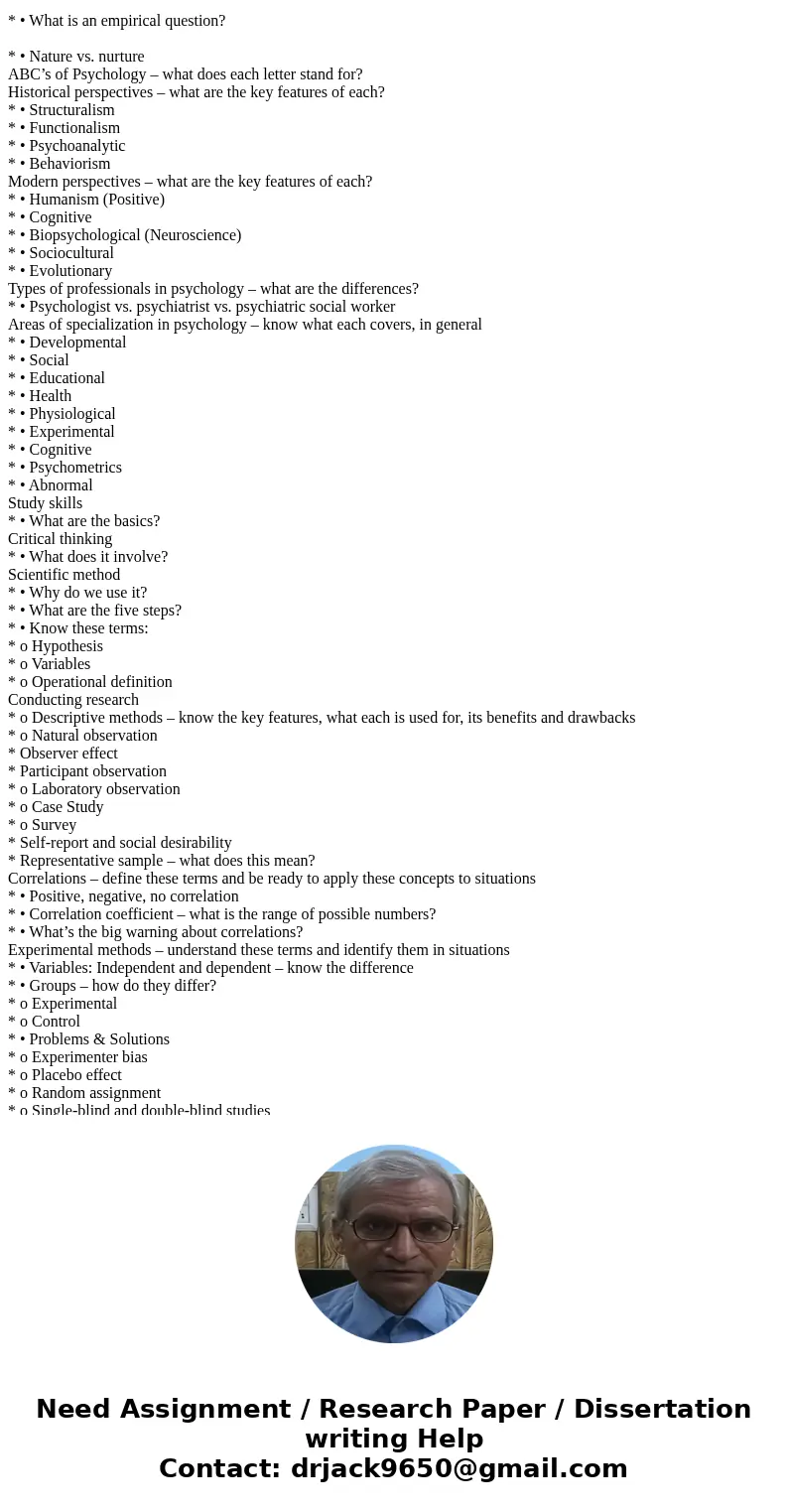
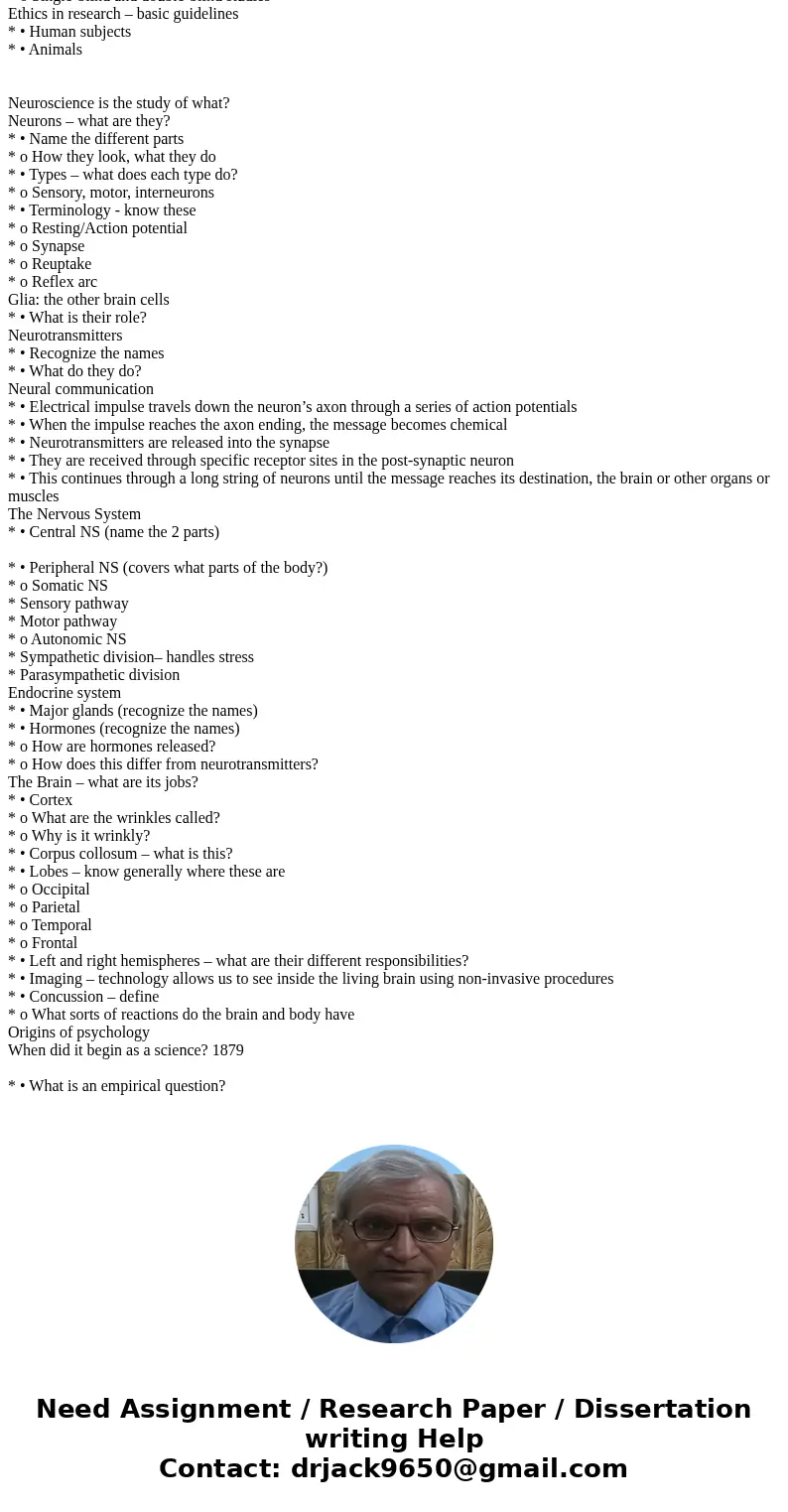
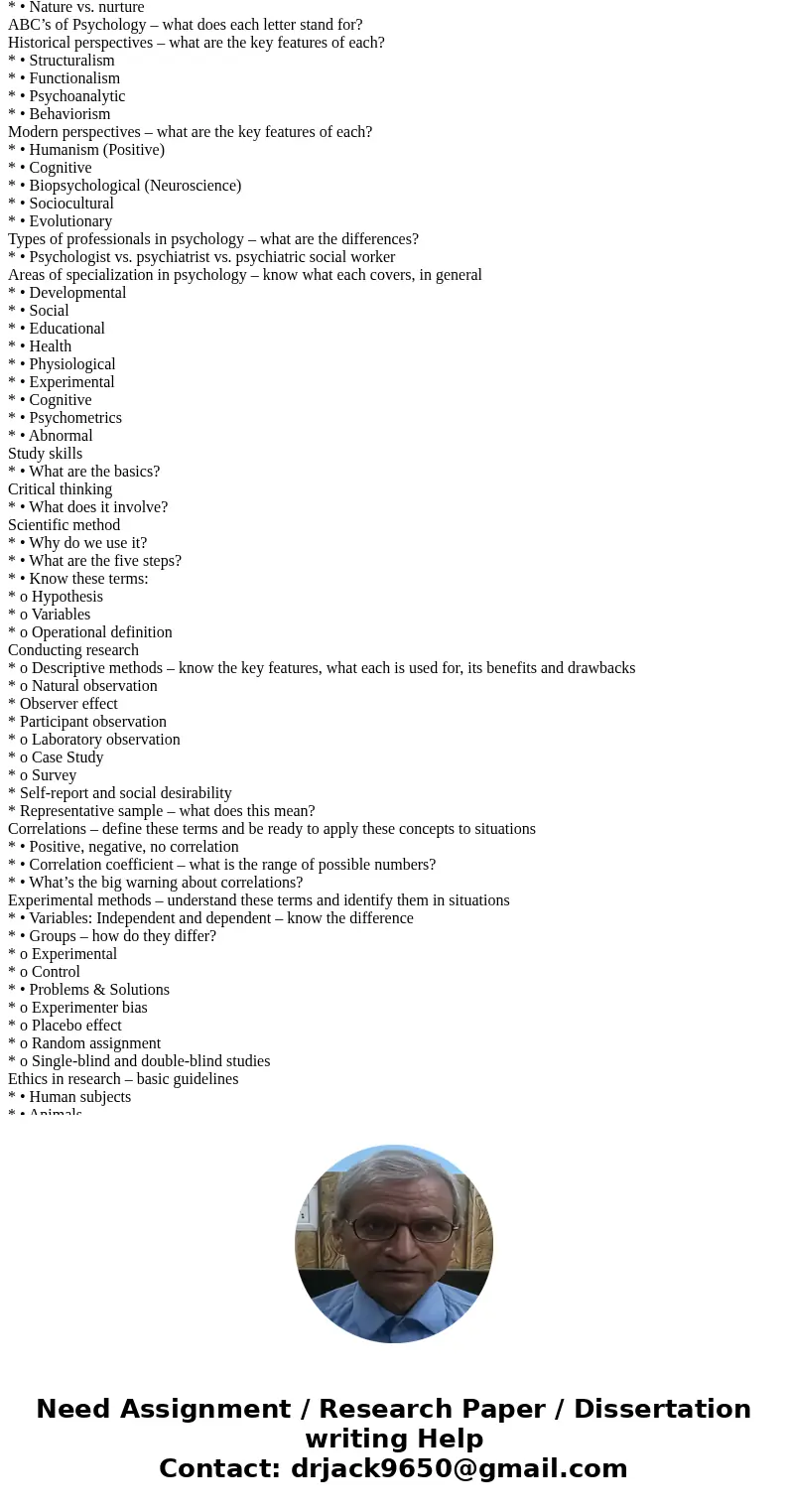
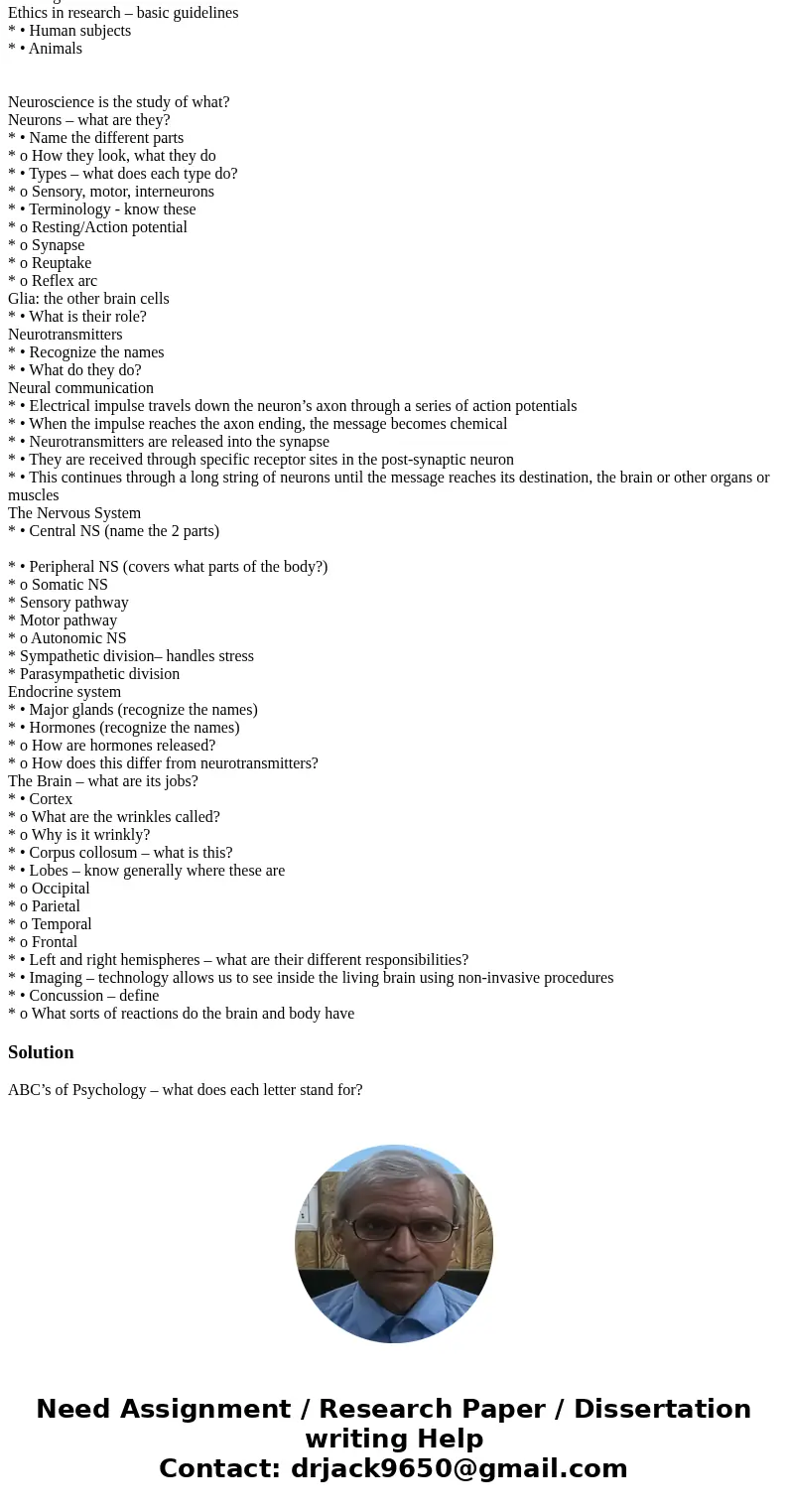
 Homework Sourse
Homework Sourse